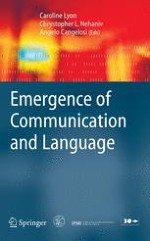2007 | OriginalPaper | Buchkapitel
13. The Evolution of Meaning-Space Structure through Iterated Learning
verfasst von : Simon Kirby
Erschienen in: Emergence of Communication and Language
Verlag: Springer London
Aktivieren Sie unsere intelligente Suche, um passende Fachinhalte oder Patente zu finden.
Wählen Sie Textabschnitte aus um mit Künstlicher Intelligenz passenden Patente zu finden. powered by
Markieren Sie Textabschnitte, um KI-gestützt weitere passende Inhalte zu finden. powered by
